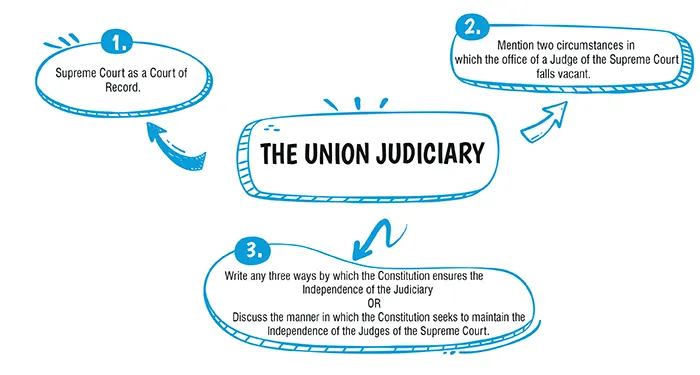Home / Board / ICSE / important Questions / Class 10 / History & Civics / The Union Judiciary
Table of Contents

Ans.(b) 2/3rd majority
Explanation:
An address to impeach a judge of the Supreme Court should be passed in each House of the Parliament, supported by a simple majority of the total strength of a House, and by a two-thirds majority of those present and voting in both the Houses. It is then presented to the President. This procedure is called the impeachment of a judge.
Ans.(d) Article-136
Explanation:
Article-136 of the Indian Constitution gives wide discretionary powers to the Supreme Court to grant a special leave to appeal in any cause or matter related to civil cases.
Explanation:
Supreme Court as a Court of Record :
(i) A court of record is a court whose acts and proceedings are enrolled for perpetual memory and testimony. The judgments are in the nature of the precedents i.e., the High Court and other courts are bound to give the same decisions in similar cases.
(ii) Article 129 provides that the Supreme Court shall be a court of record and shall have all the powers of such a court including the power to punish for contempt of itself.
(iii) Article 215 contains similar provision in respect of the High Court. Both the Supreme Court as well as the High Courts are courts of record having powers to punish for contempt including the power to punish for contempt of itself.
Explanation:
The circumstances in which the office of a Judge of the Supreme Court falls vacant are :
1. He can be removed on grounds of 'Proved Misbehaviour' or 'Incapacity’.
2. A Judge may resign himself on the grounds of health, or may retire from his office.
Explanation:
The Independence of the Judges of the Supreme Court is ensured by the Constitution in following ways :
(i) Security of Service : The Judges of the Supreme Court cannot be removed from office until they complete 65 years of age or they have been removed by the Parliament.
(ii) Emoluments not Subject to Reduction : Emoluments of judges cannot be reduced during their tenure until there is a Financial Emergency in the country.
(iii) No discussion in Legislature on the conduct of a Judge : This discussion is held only when the House wants to remove the judge, otherwise the discussion about the conduct of any judge cannot be held in any Legislature.
(iv) Freedom to Announce Decisions and Decrees : The judges have freedom to decide cases without any danger to their person, property or fame.
Download Mind Map of this chapter
Download NowWant to Practice Mock Tests of this chapter
Practice NowDownload Important Questions of this chapter
Download NowCBSE Important Questions Class 10
ICSE Important Questions Class 10
CBSE Important Questions Class 10
ICSE Important Questions Class 10